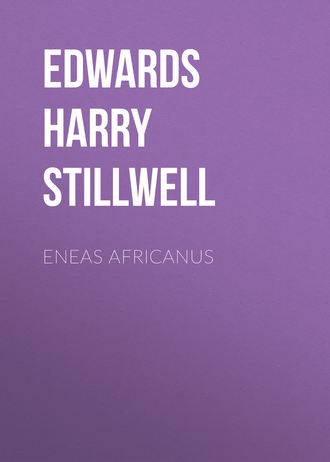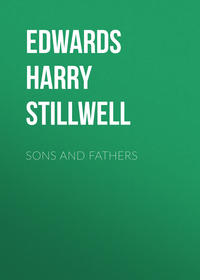 полная версия
полная версияEneas Africanus
The wedding supper was charming in its simplicity and homeliness, using the word in its original sense. The broad back porch between the two wings was closed in with smilax and the feast was spread on a great home-made table twenty feet in diameter. Seats were placed for forty. Such a display of delicacies and substantials has not been seen in this section since the good old days before the war. The low growing ferns and cut-flowers of the decorations – there by the hundreds – did not hide the guests' smiling faces. Wine, the famous scuppernong of the Major's own vintage, was the only stimulant visible, for the Major and his good lady are almost total abstainers. When the guests were seated a grace was pronounced by the Rev. Mr. Thigpen, and fun and merriment broke loose. Toast after toast was given and sentiment and the poets were interspersed with songs from the family negroes assembled in the backyard by a gigantic bonfire. Some of the songs were of exquisite harmony and pathos. Freedom, so far, had brought but little of brightness into the lives of these humble people.
A dramatic situation that will one day enter into a story, came during the supper festivities. A sudden excitement among the negroes was followed by cries, some of merriment and some of fear, and by a stampede of the juniors. In the red light of the bonfire an old negro suddenly appeared, reining up a splendid grey horse. The old man was seated in a red-wheeled road cart, enveloped in a flopping linen duster, and wore a silk hat. His "Whoa, Chainlightning!" resounded all over the place. Then he stood up and began to shout about Moses and the Hebrew children being led out of Egypt into the promised land. Major Tommey listened for a brief instant and rushed out. The newcomer met him with an equal rush and their loud greetings floated back to us clear as the notes of a plantation bell: "Eneas, you black rascal, where have you been?"
"O! Lord, Marse George! Glory be ter God! Out o' de wilderness! De projeckin' son am back ergin!"
"It's Eneas!" screamed the little bride, gathering up her skirts and rushing out. In the strong light, as the wedding party hurriedly followed, we could see the old negro hanging to his master as he filled the night with his weird cries. Catching the excitement, the negroes around began to moan and chant, taking their text from the old man's words.
"Where have you been, sir?" The Major was trying to free himself and choking with tears and laughter.
"All over de blessed worl', Marse George! But I'm home ergin! – You hyar me, niggers? – home ergin!"
"Stop, sir!" – But suddenly the old man grew rigid in the grasp of a momentous thought. His voice sank to a whisper audible to only a few of us:
"Marse George, wha's Nancy?"
"Nancy is dead, Eneas," said the Major, sadly.
"Thank God!" said the old man fervently.
"Where is my trunk, Eneas?" The old negro was making a horn of his hands and giving the plantation halloo. With his eyes set on the banking shadows beyond the fire, he waited, an inscrutable smile on his wrinkled face. Presently, into the circle of light came an old grey mare, drawing a wagon in which sat a yellow woman, hovering a small colony of children.
"I done brought you a whole bunch o' new Yellerhama, Burningham niggers, Marse George! Some folks tell me dey is free, but I know dey b'long ter Marse George Tommey des like Lady Chain and her colt! Marse George, you oughter see dat horse – "
"Where is the trunk?" repeated the Major, laughing and wiping his eyes. "Where did you leave it, Eneas?"
"I ain't left hit," said Eneas, indignantly. "Git out o' dat wagon, niggers, fo' I bus somer you wide open!" The little colony fell over the wheels like cooters from a log, and drawing aside the hay that had held them, Eneas brought forth a time and weather defying hair trunk. He heaved a mighty sigh of relief as he dropped it on the ground:
"Dar 'tis, Marse George, an' I sho is glad to git shut o' dat ol' bunch o' hide an' hair!" The bride danced and clapped her tiny hands: "My cup! My cup! Get it! Quick! O, please somebody open the trunk!"
Major Tommey picked up an axe and with one blow sliced off the ancient lock. From its snug nest in cotton batting, the bride lifted a shining cup, the cup, Mr. Editor, advertised in your columns a few weeks ago. A bucket rattled down in the nearby well and the bride-groom came with a great gourd to fill it. Then he read aloud the quaint inscription:
"Ye bryde whose lippes kysse myneAn taste ye water an no wyneShall happy live and hersel seeA happy grandchile on each knee."The little woman accepted the challenge with the cup, and smiling up to the face of her husband sipped of the crystal draught and handed him the cup. He, too, drank, but the slight flush on the bride's face was as nothing to the fiery scarlet of his own when a storm of applause greeted the act.
Eneas had drawn the Major aside and produced an old strap pocketbook stuffed with bills.
"Marse George," he began, "de bag o' yaller war money what dey gimme warn't no good over yonner whar I been. Countin' de c'llections I tuck up in the church an' what I winned on de track wid Chainlightnin' an' ain't spent – "
"Keep it, Eneas," said the Major, almost exploding with laughter, and patting the old man on the shoulder, "that bunch of Burningham Yellerhama niggers more than squares us!"


